September 1st, 2019 Issue
Hello and welcome to the ninth issue of PPM. Contained within, you'll find spiders, and dogs, and decay, oh my! Occasionally, we find ourselves falling into a theme for our autumn installment, and to compliment it, we've featured a picture taken by our Fiction Editor of a spooky B&B in Smithfield, VA. Make sure to check out Whitaker's poem "Future Refugees From Accomack County", Clary's story "Loose Dog", Liza Sofia's non-fiction piece "The Mummy", and James Cato's devastating tale "Widow's Peak". Enjoy!
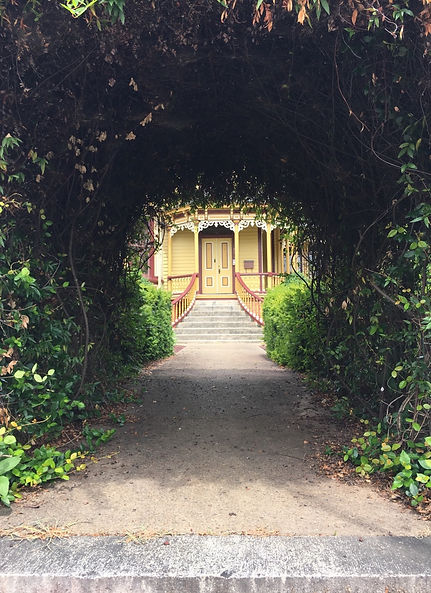
Table of Contents
Future Refugees From Accomack County
Poetry by Stephen Scott Whitaker
Little Boat of Dreams
Artwork by J. E. Crum
All My Saints
Poetry by Joseph Hardy
Sea Change
Artwork by Sarah Simon
Loose Dog
Fiction by Alison Clary
Fractures & Healing
Poetry by A. R. Bekenstein
Cephalopoda
Artwork by David Weinholtz
The Mummy
Nonfiction by Liza Sofia
Heaven
Poetry by Marcus Whalbring
Visual Art Submission
Artwork by Eleanor Leonne Bennett
The Suburbs
Flash Fiction by Madi Giovina
Worm
Poetry by Bill Ayres
Widow's Peak
Flash Fiction by James Cato
She Knew
Poetry by Hank Thompson
Interlaced
Poetry by Johanna Kristin Ellerup
Future Refugees From Accomack County
by Stephen Scott Whitaker
Carry the small child on your back. Have bills tucked for bribery. The road will be shut, houses left behind will choke in the tide, the drift wood and leaves. The first holdfast will vanish at last, a wrecked and gutted floodway. The wild dogs of the sea will salt the corn, will kill the beans; steel and brick will give way. The road will be shut. Take care of boots, shoes. Carry the child and sing walking songs. Carry your papers folded in a plastic bag. Wear double socks, and between them slip half the cash. Carry a blade, two if possible. When the child is heavy, walk slow and hold hands. Rest. Walk in groups. Avoid state roads, black bag check points. Cross over soft borders. Speak. Hold hands. Fall in love. Laugh. Walk and breathe. The road will be shut.
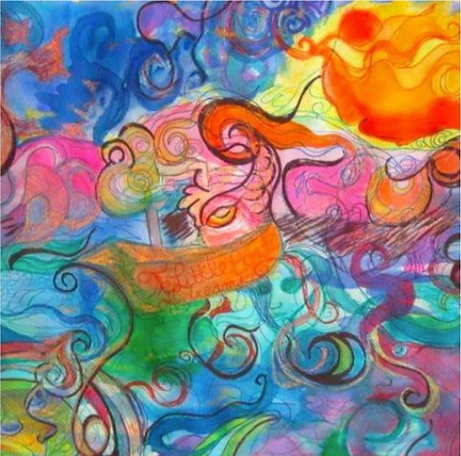
"Little Boat of Dreams"
Artwork by J. E. Crum
Stephen Scott Whitaker
Stephen Scott Whitaker is a member of National Book Critics Circle and the managing editor for The Broadkill Review. His poems have appeared in Oxford Poetry, Grub Street, and Anderbo, among other journals.
J. E. Crum
"Sea Change"
Artwork by Sarah Simon

All My Saints
by Joseph Hardy
Thank you, God, for Wheaties,
patron saint of champions,
crisp in the first bite with milk
and soggy as we drink the bowl.
And, for Mrs. Olsen,
patron saint of third-graders,
smelling beautiful standing near us,
and whose voice can calm.
Thank you, God, for Recess,
patron saint of all who need release,
and for the dodge ball
which settles all scores.
And, for your game of Baseball,
which is the patron saint of beauty,
and the slow ground ball to short,
and the slide that beats the tag.
Thank you, God, for all your saints who
intercede on our behalf. We feel them
breathing. We walk within their numinous
spheres of protection.
We hear them argue about the true
direction of our lives, and which
can help us best. We pray
they reach agreement soon. Amen.
Joseph Hardy
Joseph Hardy is one of a handful of writers that lives in Nashville, Tennessee but does not play a musical instrument; although a friend once asked that he bring his harmonica on a camping trip so they could throw it in the fire. His work has been published in Gyroscope Review, Waving Hands Review and is forthcoming in Kind Writers, and Crack the Spine Literary Magazine.
Sarah Simon
Sarah is a New Yorker at soul, living and teaching English between Ecuador and Uruguay. In 2019, she will publish her first book, "Core Collection: Poems on Eating Disorders" with Adelaide Books. Everyone in her current town of Fray Bentos, Uruguay, knows that she's obsessed with peanut butter, but she can't find it anywhere; too much dulce de leche in its place.
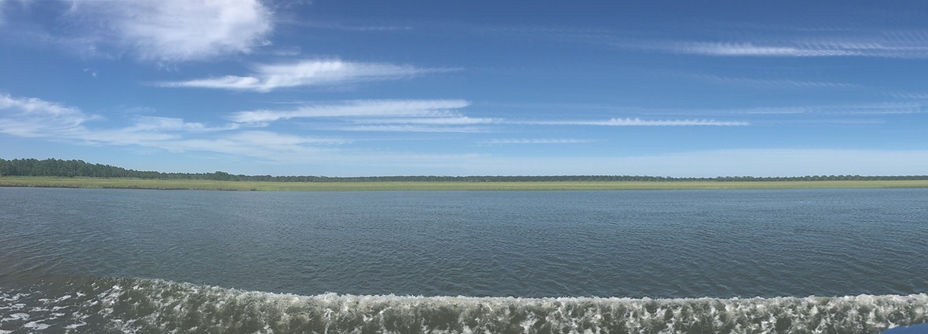
Loose Dog
by Alison Clary
“Excuse me, Miss!”
I am semi-comfortably sitting atop my lifeguard tower, but I turn my head reluctantly to address the anxious voice behind me. It’s a middle-aged woman sporting a neon bucket hat and tie-dye t-shirt, both with ‘Virginia Beach’ written in obnoxiously large white text. Her wardrobe screamed she was a tourist, as no local would be caught dead in any clothing sold at Sunsations. She’s running towards my stand in a frenzy, and my nerves start to race.
Today was supposed to be an easy day. I was assigned the northernmost stand away from the chaotic crowds trickling down from the boardwalk. It was my first day returning as a guard after taking a long hiatus to attend law school. On what was supposed to be my last day guarding three years prior, I said my bittersweet goodbyes to my supervisors and fellow guards. The Captain jokingly reminded me that he gave me my first job as a teenager and to remember that if he ever needed legal advice after I became a hot shot lawyer. Little did he know that not only would I fail to become the next Amal Clooney, but that I would also be the only one of my law school friends to not receive a single job offer at graduation – thus forcing me to return to my teenage summer job.
I had unenthusiastically reapplied to be a guard after being turned down for waitressing jobs at several local restaurants due to a ‘lack of relevant experience’. Although I had enjoyed my many summers guarding the beaches of my charming hometown of Virginia Beach, I had since moved on with my life and returning to the 757 was not part of my self-decided life plan.
“Yes?” I shout back to the woman in the pink hat.
She’s out of breath, so I can’t quite comprehend her response.
I signal to adjacent guards and leap off my stand in an attempt to communicate with her more effectively. I fail to stick the landing and plop embarrassingly on my rear end, but the woman is too frantic to even notice. After quickly hopping back to my feet, I try to address her again.
“M’am, I need you to calm down. What is the problem?”
Still gasping, she points to a massive yellow dog running around and playfully terrorizing groups of beachgoers off in the distance. Sadly, dogs are not allowed on the beach during the summer months and one of the guards’ many duties was to enforce this frivolous rule.
“All right, Miss. Don’t worry, I’ll handle it,” I say while trotting with my buoy in hand towards the menacing dog.
You have got to be kidding me. My law school friends are dressed in their professionally tailored suits reading case files today, and this is what I’m doing.
As my overly tight red bikini indicates, I am out-of-shape, and the run towards the yellow canine seems like an eternity. Luckily, the shore breeze is on my side and helps to push me along.
I begin to close in on the friendly, yet massive dog. He is circling like a shark around a large family innocently eating their Ziploc packed sandwiches. The youngest girl holds her PB&J just a little too far away from her mouth, and the dog quickly jumps and gobbles it down in one bite. Rather than throwing a tantrum, she laughs hysterically. Her grandmother is not amused and yells “GET” while shooing the dog away.
The dog quickly redirects after noticing two teenage boys tossing a nerf football back and forth in the ocean. He darts toward them, and I chase behind him while fiercely blowing my whistle and shouting “here boy” repeatedly. He ignores me and starts splashing through the shore break.
I’m getting too old for this.
I follow him, while deliberately trying to avoid holes in the sand so as not to fall again. By this point, my debacle had earned the attention of many beachgoers who were loudly cheering me on. As embarrassing as the fiasco was, I had to admit it felt good to have people rooting for me.
The dog intercepts the nerf ball from the unsuspecting teenagers and doggy paddles back towards shore while proudly showcasing his new toy in his mouth. He spots me and successfully dodges me in the water, so I swim after him, ferociously paddling as quickly as my out-of-shape arms will allow. Suddenly, my left hand reaches the end of his long wiry tail. Out of fear of losing him again in front of my newly acquired audience, I hold on to his tail and let him tow me to shore. When I feel we have reached shallow water, I extend my other hand and grab his collar as we walk past the shore break. I notice his tag reads, “Max”.
The beachgoers applaud and giggle as I start to pull Max back towards my stand.
“Hey, which one of you is the lifeguard?” asks a tourist with an outwardly comedic personality.
I burst out in hysterical laughter, and I quickly realize it is the first time I’ve really laughed in quite some time. With one arm holding my buoy and the other still pulling Max, I see the woman with the pink hat coming towards me.
“Oh my goodness, thank you so much for helping me grab my sweet Max,” she exclaims.
“I didn’t realize he was your dog.”
“Yes, I know dogs are not allowed on the beach, but we drove all the way from Minnesota. We are leaving today and I wanted to show him the beach quickly before we left.”
She apologized profusely and explained how Max was instantly enamored with the sandy beach and even broke his leash trying to rush towards the shore’s waves.
“It’s all right, Miss,” I respond.
I create a make-shift leash out of excess rope I use to tie my umbrella to my stand. She thanks me and lovably tugs Max back towards the boardwalk.
Exhausted, I climb up the three laddered steps and signal to my adjacent stands that I am resuming my post. I glance down at my watch and realize I now have only seven hours to go.
Alison Clary
Alison Clary is a travel and feature writer from Virginia Beach, VA. When she is not writing about her food experiences or participating in fiction competitions, you'll find her at home pampering her deaf senior rescue dog, Stanley.

Fractures & Healing
by A. R. Bekenstein
My cells transform
Shattered bone
Into Osteoblast.
I am perpetual cycles of
Apoptosis and
Cellular regeneration.
All that is broken can
Heal,
Every shard
Assimilated and reabsorbed,
Pieced together like patchwork.
Each strand of my DNA is merely
A fragmented assembly of molecules,
A collection of nucleotides;
We are all just
Conglomerations.
Add and subtract,
Create and destroy;
My body is a constant state of
Catabolism and
Anabolism.
Every moment
I am disassembled and repurposed—
Dismantled and destroyed,
Torn to shreds and
Reconstructed.
I bask in the chaos:
Reborn.
"Cephalopoda"
Artwork by David Weinholtz
A. R. Bekenstein
A. R. Bekenstein is a tiny human being with a big voice, and after years of her mind replaying her abuser ordering that she "be quiet", she's finally decided not to be. A native of Richmond, Virginia, she is currently an undergraduate student at Wesleyan University in Connecticut and has poems forthcoming in Constellations.
David Weinholtz
David has exhibited and sold work throughout America, in private and juried shows. Additionally, he is frequently commissioned by patrons to create anything from abstract pieces, to portraits and landscapes.

THE
MUMMY
by Liza Sofia
There’s a mummy on display at the museum, lying in an age-old stone sarcophagus adorned with faded hieroglyphs. There is silence on the exhibit floor despite the restless observers who move as quickly as breaths. On the inhale, I am one in a crowd of a dozen onlookers. On the exhale, I am alone. A new crowd flocks around the display by the very next breath. There is so much motion around me that I begin to find the mummy’s profound stillness unnerving. I place my hand on the cool glass, expecting it to shatter under the weight of the stillness, but it is immensely denser than I could’ve imagined.
Beneath my palm, I can feel four millennia of space between us.
With my eyes, I unravel the mummy’s linen bandages starting at a fingertip. I reconstruct the corpse as I undress it, mending fragmented bones and replacing rotted flesh with olive skin. I inject life where there is hollowness until I am left with what appears to be a sleeping man.
As I stare at his newly formed face, I can’t help but wonder if he had a distaste for Moonfish or a collection of handcrafted figurines made from Nile River silt. I wonder if he had a lover who reminded him of blossoming lotus flowers. The dichotomy between the sleeping man’s rejuvenated skin and the archaic sarcophagus in which lies reminds me that he is my future, and I am his past. I feel the space between us begin to wane.
Time passes as quickly as breaths.
On the inhale, the Great Wall of China is built.
On the exhale, Rome falls.
On the inhale, the plague wipes out a third of Europe.
On the exhale, the first man sets foot on the moon.
On the inhale, there is a man with a distaste for Moonfish, and a collection of handcrafted figurines made from Nile River silt, and a lover who reminds him of blossoming lotus flowers.
On the exhale, there is a mummy on display at the museum, lying in an age-old stone sarcophagus adorned with faded hieroglyphs.
Liza Sofia
Liza is a nineteen-year-old university student in Rochester, New York currently studying French and Economics. Her passion for the literary arts started in early childhood, and by age seventeen, she finished her first book manuscript. Liza has hopes of becoming a novelist.

Heaven
by Marcus Whalbring
The sky purples over the leaves we’re burning in the yard.
You see the heaven in that sentence?
How about this:
I stood, like a whisper, in the palm of a single shadow.
We talk about heaven like we know
what it is, or where,
reaching our eyes toward the stars
without looking at the stars,
without ever reading the blissful rhythm flickering
within a sentence. For instance:
The cemeteries of the spider’s legs climbed
the side of a noiseless, fallen oak,
the spider itself, like a living bracelet,
clasping the last branch
still golden with the last of evening’s breathing.
Some say heaven is in our minds, but maybe
it’s in a single thought tied up,
if we could only pull a strand
and let it go, open it like a gate, and
say it the first time, then say it
again and again, whenever we need to,
when we’re driving home from work after a long
day, when we hunger
to be seen and understood, when the anger
of the world climbs its way to us with its long
arms while we’re eating
or opening a window,
or just raking together leaves
to be burned under a smoke-grey sky.
"Visual Art Submission"
Artwork by Eleanor Leonne Bennett
Marcus Whalbring
Marcus Whalbring lives in southern Indiana with his wife and children. He earned his MFA from Miami University and his work has appeared in The Cortland Review, Spry, The Oakland Review, Underwood Press and others. His poetry Collection How To Draw Fire is forthcoming from Finishing Line Press.
Eleanor Leonne Bennett
Eleanor is the CIWEM Young Environmental Photographer of the Year 2013 and has also won first places with National Geographic,The World Photography Organisation, Nature's Best Photography and The National Trust to name only a few. Eleanor's artwork has recently been featured in the latest season of Showtime's series Billions & her boutique shop The Vintage Compact Shop has had props featured in the most recent series of Killing Eve. Her photography has been published in the Telegraph, The Guardian, The British Journal of Psychiatry, British Vogue, Harper's Bazaar

The Suburbs
Madi Giovina
I don’t want to die on a suburban road, so should I stop going to the suburbs?
I asked my boyfriend this, after driving four hours to visit him somewhere in Rhode Island. We were in his beat up dark red Volvo he had driven over from Michigan. He was from Michigan, but living in Rhode Island that summer, for a job or something. I can’t tell you the name of the town I just know the closest big city was Providence and that was ... a very small city. But still it reminded me of Philadelphia and San Francisco and every place I had lived up until that point. I didn’t know if it was because I was projecting the love I had for him onto all of those cities, or because of the grit and the hills.
What the f*** are you talking about? He turned the radio down with one hand, kept his left hand on the steering wheel, driving straight confidently down this suburban road. He was sensitive. I angered him a lot. I should have known this would offend him; he grew up in the suburbs, he was the suburbs. His friends even nicknamed him that. Suburbs. And I had offended Suburbs, again. Should I stop going to Suburbs? I asked myself in my head. I don’t want to die on a road with Suburbs, so maybe I should stop seeing Suburbs. Maybe I should move out of Suburbs. Ah, but Suburbs was so safe and so comforting.
I kissed his right hand, cautiously. It was still on the radio dial. I put my fingers on top of his, turned the music back up and tilted my head back.
Relax relax. I was only joking. Remember Jokes?
My friends called me Jokes. My friends loved Jokes and hated Suburbs. Suburbs hated Jokes but said he loved me. I told him that didn’t make sense, but that angered him. Suburbs is sensitive. I have to be careful what I say around him. He’s fragile, like an egg. A small, fragile, suburban egg. And he would crack soon, I knew it. He would crack right over our whole relationship. And no matter how much I tried to fill the cracks with Jokes, I knew some yolk would get out, the last trace of us, fossilized on some freeway in some part of Rhode Island. I knew then that I needed to leave Suburbs. I said, goodbye Suburbs and thank you Suburbs, and I put the window down and jumped out, head first. I rolled off of the freeway and into freedom, not a drop of yolk on me.
Madi Giovina
Madi Giovina is a writer turned computer scientist turned writer again. She was born in Philadelphia at some point in the 90s. She has her B.S. in Computer Science from Harvey Mudd College. Madi lives in San Francisco where she is an active member of Double Union Feminist Makerspace and DJs at BFF.fmon the weekends. She is currently compiling super / natural: an anthology of visionary art and fiction, and working on multiple short stories about the apocalypse.

Worm
by Bill Ayres
Remove the rocks from this field
—stones, pebbles, nails, bits of glass—
and I will plow it with my body.
My diving in will be obscured by clouds.
The sound of the splash will be muffled.
I’ll alternate between breast stroke, butterfly,
back stroke, where I once would have dug like a dog.
It takes forever to push the hands in,
to pull myself along,
keeping the fingers cupped to hold the soil,
forever to turn my head to one side so I can breath,
sucking in clay, grass, manure,
blowing out dust.
It takes effort to kick my legs, especially making turns.
When I finish, I’ll need help getting out, toweling off.
Tomorrow, I will sleep all day,
my eyes squeezed tight as they are when I swim.
I clinch them shut
Bill Ayres
Bill Ayres has worked in bookstores in Hampton Roads since the invention of movable type. His poems have appeared in Hoot, Commonweal, The Anglican Theological Review, Sow's Ear, Bird's Thumb, Jelly Bucket, The Hollins Critic, The Powhatan Review, Kit Cat Review, river city, Small Pond.

Widow's Peak
by James Cato
Scroll Down
The Mister was warming water for grits in the kitchen while a deadly spider climbed into his empty boot. She, the spider, took a liking to the broken-in toe that smelled of salt and wool and began tucking webs in the corners in preparation for her children’s arrival.
The Mister had long ago been a harsh man. However, he had since suffered immensely, in a way that commands empathy. Where he once heard rattlesnakes he now heard maracas. The unloaded gun in his safe was more often forgotten than dusted, let alone fired.
The spider, known as the wicked widow, was no more inclined toward violence. She was a shoe-polish black, shinier than the boot roof above her, and sought out comfortable nooks to spend her days. Her husband had not been cannibalized as they claimed; he had scuttled off far too quickly for that. The scarlet warning on her belly was shaped like a church bell, not an hourglass.
The Mister shook his boots from the closet while five-and-a-half-year-old Mariah ate the grits. It was his turn to take Mariah to school. If you told him who was laying eggs in his left boot, he would have planted it under the glass table on the patio for a few weeks, to wait for the widow to collect herself and move out. He would have known that this was a soft nook without a pestering husband, that this was the widow’s peak.
The spider, at the motion, played dead by bunching up, all legs, no bones. The Mister was putting on his right boot now and she waited. She had faced down death nearly every day and her instincts had thus far served her well. She had pirouetted from frantic swats, danced out of flooding crannies, even tiptoed across a tennis court where she would have been an easy orb to squash. She had lost a front leg to the snap of a bird beak and the remaining seven had carried her here, thin and wobbly as high heels.
The mister would have respected her story if you told it to him. His was not much different. When he slid his left foot into his left boot wicked widow rolled into the toe, and when she could not escape she bit down in defense of her children, venom stronger than a rattlesnake’s, straight through his sock and into the carbon fiber of his prosthetic, where it went unnoticed. She was mashed all day long, as the mister held Mariah’s hand and visited the post office and paced through his traumatic flashback, until she was nothing more than a color, a rain cloud on the end of his sock, which came out of the fabric on the “normal” setting in the washing machine.
James Cato
James Cato writes on the sidewalk. Find more of his work in Montana Mouthful, Chrome Baby, and Brilliant Fiction magazines.
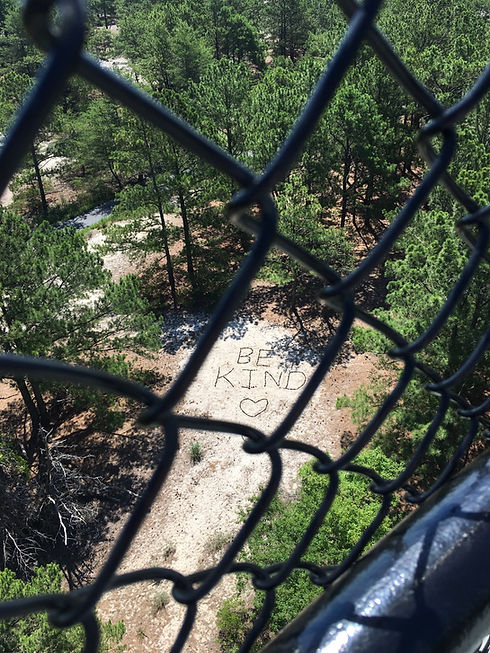
SHE KNEW
by Hank Thompson
She Knew
My father only said enough
to babytalk trout,
curse worms curled
in his tomatoes
On the Sabbath
he puffed his panatela
while he and I waited by the curb,
for my mother to
talk, talk, talk
her way outside the doors
At dinner
my father and I
slurped his homemade stew,
my mother spilling Dorcas Class drama
About the time I married,
she confided
that my father had never told her those
three little words
I asked about that once
He barked
She knows I love her!
turned away
said no more
After they both were gone
I stumbled on an 8x10
their wedding picture
in the bottom of a drawer
There
I saw to my surprise
an open wide smile
laugh-light in his eyes
Then
I knew, too
Hank Thompson
Hank Thompson is a retired Speech-language Pathologist. He lives in the house in which he grew up, in the Colonial Place section of Norfolk, Virginia. He often writes about personal experiences from his original neighborhood and home city.
Two hands clasped together with interlaced fingers,
A lifetime contained in two,
Each finger a decade, each finger a day.
The first is brave and determined,
To burst forth on instinct, on command,
The decades of youth in a fleshly fold,
To scold or grasp, aim or hold,
As a pair, twice bold.
The second is long and steady,
Anchor of the set,
The passion of youth has tempered with age,
To learn or act, create or engage,
As a pair, twice sage.
The third is where commitment stands,
Tether to the heart,
The ending of youth’s last battle is here,
To accept or judge, deny or bear,
As a pair, twice dear.
The fourth is shorter still, completion of the set,
The twilight of two lives,
It recedes as the passing of time is nigh,
To rest or lie, laugh or cry,
As a pair, once die.
Each finger a decade, each finger a day,
One lifetime contained in two,
Two hands clasped together with interlaced fingers.
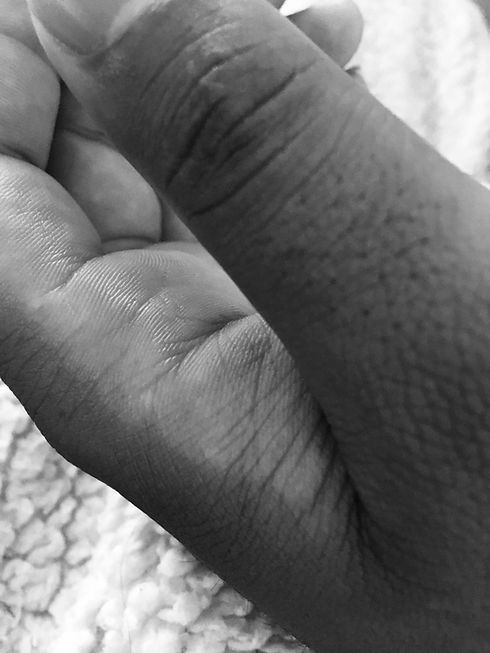
Interlaced
by Johanna Kristin Ellerup
"Topographical Epidermis"
J. J. W. Marlins
Johanna Kristin Ellerup
"Interlaced Fingers" expresses the connectedness of laced fingers; symbolically as a whole unit of connected parts, where each finger is equally a day or a decade. The Index finger filled with youthful exuberance and morning's first, and culminating in the retracted, passive last finger of old age and the close of day. Each individual and unique, yet strengthened as a pair. As for myself, I am a PharmD, single and live in a quiet NY neighborhood with my senior father and several rescue pets.
J. J. W. Marlins
J. J. W. Marlins is a student at Tidewater Community College. He enjoys hand-modeling part-time and is a strong believer in the maxim "Art looks good. Therefore, art is good." In his spare time, he can be found hanging out with his dog Lucy, "Lucille Van Pelt", and dreaming of the sweet sweet engine swap he will do on his Subaru.

As we reflect on the culmination of this issue, we did start to notice a pattern. Dogs, boots, spiders, dust, and decay were popping up all over the place. It's hard to say if these topics just naturally go together or our own particular preferences and biases were at work. Whatever the case may be, now that we're aware of them, who's to say if they will stay the same of change completely? Send us all of your old boot/dog/spider stories and see what happens. Or don't. The choice is yours. As always, thanks again to all of our tremendous contributing artists, and to our writers and poets. You are the unvarnished steering wheel of our two-and-half mast, rugged and rickety ship that navigates the waters of small online lit magazines. We also apologize for the nature of this philosophical outro. It's been a hot summer, and we are avidly looking forward to fall, and of course, the winter issue of PPM. Stay tuned. And thanks again to the staff of PPM, we love you all.
Sincerely,
The Editors of Penultimate Peanut Magazine.